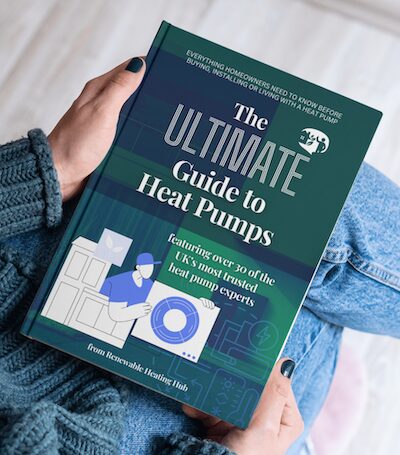Flow rate vs emitter 'openness', and CoP?
Struggling to get my head round this so grateful of others' thoughts:
Assuming the flow rate is fixed, and that lower flow rates (between 8 and 11L/m) still allow sufficient flow around all my emitters, am I correct in thinking a higher flow rate (14 - 17L/m) and more-closed emitters are preferable rather than the other way round?
It seems my system reports a higher CoP when I run in this way - I assume this means I can run at lower flow temps too, as the dT is smaller / the return temp is higher relative to the flow temp, and a higher flow rate allows the return temp to remain closer to the flow temp, and therefore reduces heating (and therefore power usage) and cycling.
My logical assumption would be a lower flow rate and more open UFH loops because more heat can be absorbed by the screed, but a higher flow rate for rads as it achieves higher mid-point temp, but I'm not sure why/if it's any different between emitter types nor how to determine the flow temp/rate 'tipping point', as it were.
In summary, if I had the choice of a lower flow rate and opening up the emitters more, or a higher flow rate and them being more closed, which should theoretically be better for efficiency / reducing flow temps / cycling?
In another post, @jamespa wrote:
Yes!"In summary, if I had the choice of a lower flow rate and opening up the emitters more, or a higher flow rate and them being more closed, which should theoretically be better for efficiency / reducing flow temps / cycling?"Im not sure you really have the free choice or what you are assuming is kept constant/varied in the two scenarios
Im assuming that you want to keep the heat output from the emitters constant, to preserve the room temperatures.
Well, I guess slightly-more nuianced - see below.
The lower flow temp constraint (in bold) is useful to know, and noted - thank you.The heat output from the emitters is determined by the difference between the average emitter temperature and IAT, not directly by flow rate.However if you can increase the flow rate through the emitters you will reduce the deltaT across the emitters which means that the average temperature is closer to the flow temperature, which in turn means that the flow temperature can be lower (but only by a degree or so) for a given average emitter temperature.
That makes sense as you've explained it.This will be more efficient and is one of the reasons we operate heat pumps at a lower deltaT (across emitters) than boilers.
Noted. I have read elsewhere that rads generally require a different flow rate to UFH loops (and if so, why - if they are the same diameter pipework?) - is this just in essence the same as flow-rate-to-emitter, whereby each UFH loop openness is adjusted to allow for required IAT?This answer is independent of the emitter type.
Perhaps a better way to have written it would be: "Flow rates + temps vs emitter 'openness', and CoP?" - thereby the question becomes "If the IAT can be maintained (or even raised?) by a higher flow rate, reduced flow temp (by up to 1deg C), and adjustment to emitter 'openness', which should result in the higher CoP/better system operation?"Does that answer the question?
or even: My logic says, if all UFH loops are more closed, less heated water is going round the loops and therefore the returning water is of a higher temperature and is therefore being 'wasted' / bypassing the emitters. If the dT were larger, the heater has to work harder to heat the LWT but more is being 'used'; which should be most-efficient?
Posted by: @rhh2348Noted. I have read elsewhere that rads generally require a different flow rate to UFH loops (and if so, why - if they are the same diameter pipework?) - is this just in essence the same as flow-rate-to-emitter, whereby each UFH loop openness is adjusted to allow for required IAT?
I guess that depends on where you measure it. If measured at the heat pump then the flow rate for any given heat transfer at any given deltaT (across emitters) is the same. If you measure it at the emitters then not so, because you generally have 10+ radiators and maybe 4-6 UFH loops. That said I dont know if you typically operate UFH at a lower deltaT even than radiators (it cant get much lower)!
Posted by: @rhh2348"If the IAT can be maintained (or even raised?) by a higher flow rate, reduced flow temp (by up to 1deg C), and adjustment to emitter 'openness', which should result in the higher CoP/better system operation?"
As always lower flow temperature = higher COP. However once you get down to UFH temperatures the effect gets smaller
.
Posted by: @rhh2348My logic says, if all UFH loops are more closed, less heated water is going round the loops and therefore the returning water is of a higher temperature and is therefore being 'wasted' / bypassing the emitters.
Qssuming you keep the flow temperature the same: If UFH loops are more closed the flow rate through the UFH will be less so the deltaT will be higher so the average temperature of the UFH will be lower so you emit less. The returning water is of a higher temperature but thats because the UFH emits less so the room will be colder.
Posted by: @rhh2348If the dT were larger, the heater has to work harder to heat the LWT but more is being 'used'; which should be most-efficient?
In principle the former for the reason stated
However, at low FTs the effect can be small and if its also a low loss house and mild weather than things like the consumption of the water pump become significant in comparison to the energy for actual heating. Also the effect of cycling may be important at this low output. At this point the simple thermodynamics-based arguments above break down and the engineering starts to matter. Whether anyone really cares at this level is a moot point, since the cost of heating is now very small!
4kW peak of solar PV since 2011; EV and a 1930s house which has been partially renovated to improve its efficiency. 7kW Vaillant heat pump.
- 27 Forums
- 2,495 Topics
- 57.8 K Posts
- 256 Online
- 6,220 Members
Join Us!
Worth Watching
Latest Posts
-
RE: Setback savings - fact or fiction?
@cathoderay The input power is largely determined by...
By RobS , 13 minutes ago
-

RE: Humidity, or lack thereof... is my heat pump making rooms drier?
@editor, this is now an example of greenwashing in the ...
By Majordennisbloodnok , 24 minutes ago
-

RE: Electricity price predictions
@transparent Im impressed by all your work on this. ...
By JamesPa , 2 hours ago
-

RE: Solis inverters S6-EH1P: pros and cons and battery options
Just to wrap this up here for future readers: The S...
By Batpred , 2 hours ago
-
RE: Struggling to get CoP above 3 with 6 kw Ecodan ASHP
Welcome to the forums.I assume that you're getting the ...
By Sheriff Fatman , 2 hours ago
-

RE: What determines the SOC of a battery?
I agree. Fogstar confirmed that the Seplos BMS does ...
By Batpred , 3 hours ago
-
RE: Say hello and introduce yourself
@editor @kev1964-irl This discussion might be best had ...
By GC61 , 4 hours ago
-

RE: Testing new controls/monitoring for Midea Clone ASHP
@benson — as @tasos suggests, plotting multiple variabl...
By cathodeRay , 6 hours ago
-

@painter26 — as @jamespa says, it's for filling and re-...
By cathodeRay , 8 hours ago
-

RE: Oversized 10.5kW Grant Aerona Heat Pump on Microbore Pipes and Undersized Rads
@uknick TBH if I were taking the floor up ...
By JamesPa , 18 hours ago
-

RE: Getting ready for export with a BESS
I would have not got it if it was that tight
By Batpred , 20 hours ago
-
RE: Need help maximising COP of 3.5kW Valiant Aerotherm heat pump
@judith thanks Judith. Confirmation appreciated. The ...
By DavidB , 23 hours ago
-

RE: Recommended home battery inverters + regulatory matters - help requested
That makes sense. I thought better to comment in this t...
By Batpred , 24 hours ago
-
Bosch CS5800i 7kW replacing Greenstar Junior 28i
My heat pump journey began a couple of years ago when I...
By Slartibartfast , 24 hours ago
-

RE: How to control DHW with Honeywell EvoHome on Trianco ActiveAir 5 kW ASHP
The last photo is defrost for sure (or cooling, but pre...
By JamesPa , 1 day ago
-

RE: Plug and play solar. Thoughts?
Essentially, this just needed legislation. In Germany t...
By Batpred , 1 day ago
-
RE: A Smarter Smart Controller from Homely?
@toodles Intentional opening of any warranty “can of wo...
By Papahuhu , 1 day ago
-
RE: Safety update; RCBOs supplying inverters or storage batteries
Thanks @transparent Thankyou for your advic...
By Bash , 1 day ago
-
RE: Air source heat pump roll call – what heat pump brand and model do you have?
Forum Handle: Odd_LionManufacturer: SamsungModel: Samsu...
By Odd_Lion , 1 day ago
-
RE: Configuring third party dongle for Ecodan local control
Well, it was mentioned before in the early pos...
By F1p , 2 days ago
-

RE: DIY solar upgrade - Considering adding more panels
I know this is a bit old, but it made me wonder what co...
By Batpred , 2 days ago
-

RE: New Vaillant aroTherm Plus in black - When will it come to the UK?
@majordennisbloodnok Daikin, take note! (In fact, I hav...
By Toodles , 2 days ago
-

RE: Midea ASHP – how to set weather compensation
@mk4 — good work! First, I agree, no evidence of cycl...
By cathodeRay , 2 days ago



